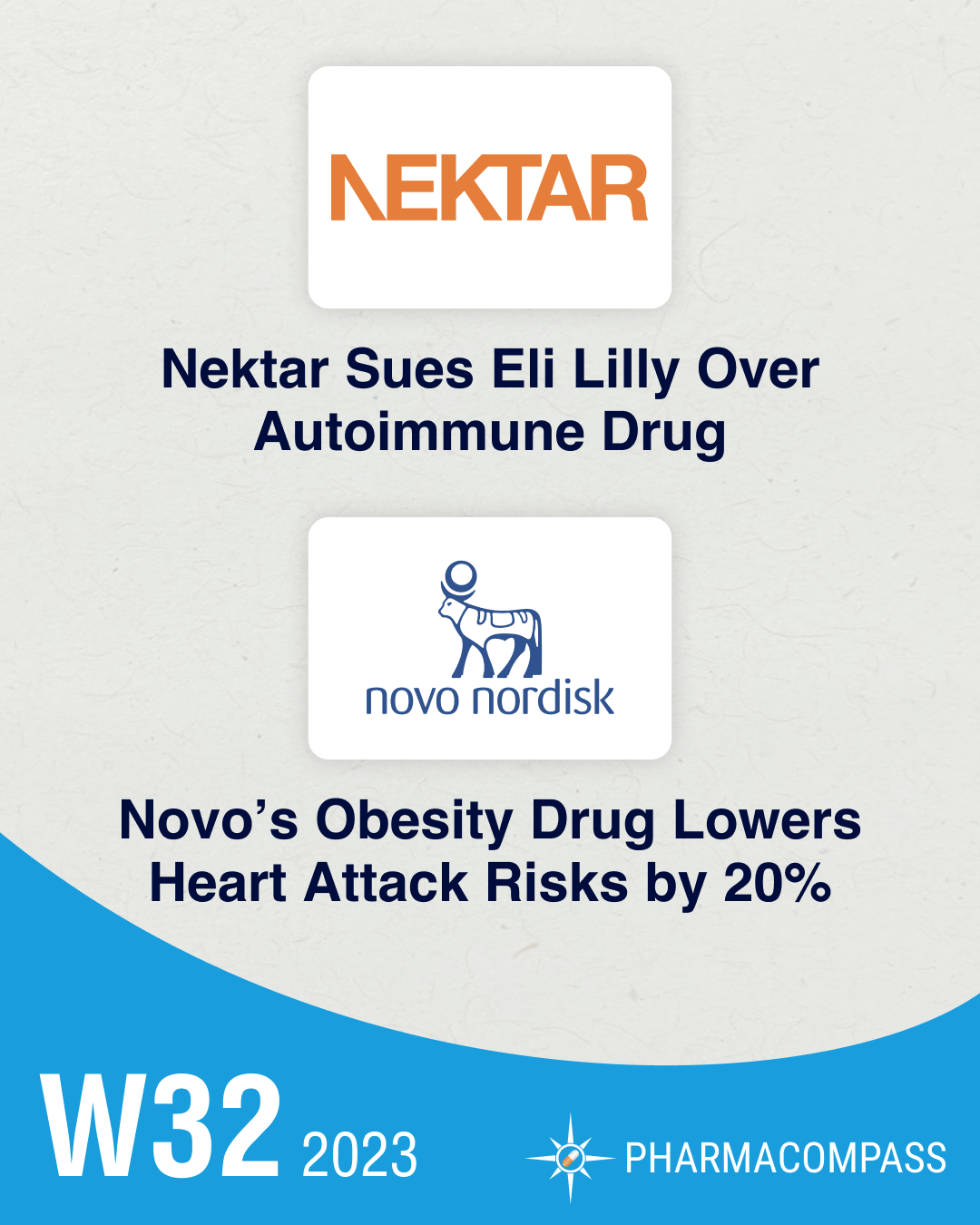
By PharmaCompass
2023-08-10
Impressions: 1,412
This week, we bring you news about Nektar Therapeutics filing a lawsuit against Eli Lilly for undermining the potential of a drug the two drugmakers were jointly developing to treat autoimmune diseases.
A late-stage study conducted by Novo Nordisk on Wegovy showed that the obesity med lowers the risk of cardiovascular death, heart attack, or stroke by 20 percent. Eli Lilly’s diabetes drug Mounjaro, on the other hand, saw its sales rise by over 72.3 percent during the last quarter to touch US$ 979.7 million.
In approvals, Biogen and Sage Therapeutics’ oral pill, Zurzuvae (zuranolone), bagged US Food and Drug Administration’s (FDA) nod to treat postpartum depression (PPD). However, Zurzuvae got rejected as a treatment for major depressive disorder (MDD). And, Astellas Pharma’s Izervay (avacincaptad pegol intravitreal solution) received FDA approval to treat geographic atrophy (GA) secondary to age-related macular degeneration (AMD).
Meanwhile, the World Health Organization (WHO) has identified yet another Indian manufacturer producing contaminated common cold syrup, this time in Iraq. AstraZeneca inked an mRNA manufacturing deal with China’s CanSino Biologics for the supply of mRNA products. And Emergent BioSolutions has revealed plans to downsize its contract development and manufacturing organization (CDMO) services business at select facilities and cut 400 jobs.
Nektar sues Lilly for botching up analysis of formerly partnered drug rezpeg
Nektar Therapeutics has filed a lawsuit against Eli Lilly, accusing the company of undermining the potential of rezpegaldesleukin, a drug they were jointly developing to treat autoimmune diseases. In 2017, both companies had formed a partnership to develop and potentially market the drug. The complaint, submitted in a federal court, alleges breach of contract, negligent misrepresentation, unfair competition, and other misconduct by Lilly. The lawsuit seeks various remedies, including compensatory and punitive damages.
Nektar, which regained full control of the drug this year after the partnership ended in April, also highlighted that Lilly had inaccurately reported data from two early-stage studies involving rezpegaldesleukin for treating eczema and psoriasis.
Novo’s obesity drug Wegovy lowers heart attack risks by 20 percent
Novo Nordisk’s recent late-stage study on Wegovy (semaglutide 2.4 mg) to prevent major cardiovascular events met its primary goal by reporting a 20 percent drop in the risk of cardiovascular death, heart attack, or stroke in overweight and obese patients. These findings hold potential to sway insurers in the US and cost-conscious health authorities in Europe to extend coverage for Wegovy to a wider patient group.
Mounjaro Q2 sales skyrocket: Eli Lilly’s diabetes drug, Mounjaro, witnessed significant growth in second quarter (Q2) and is likely to be approved soon to treat obesity. Sales of Mounjaro leaped by 72.3 percent to reach US$ 979.7 million in Q2 of this year. Lilly’s global revenue for Q2 2023 reached US$ 8.31 billion, marking an increase of 28 percent.
Biogen, Sage’s Zurzuvae approved for postpartum depression, rejected for MDD
Biogen and Sage Therapeutics’ oral pill, Zurzuvae (zuranolone) received FDA approval for treating postpartum depression (PPD) in women, making it the first and only daily oral treatment for PPD with rapid efficacy. The pill is likely to become available for commercial use in Q4 2023.
The drug’s approval, however, was overshadowed by its rejection to treat another, more common condition known as major depressive disorder (MDD).
Vistagen’s social anxiety nasal spray achieves late-stage study goals: Vistagen Therapeutics reported positive data from its late-stage trial evaluating its investigational nasal spray — fasedienol — for the treatment of social anxiety disorder.
Astellas eye drug Izervay bags FDA nod: Astellas Pharma’s Izervay (avacincaptad pegol intravitreal solution) received FDA approval to treat geographic atrophy (GA) secondary to age-related macular degeneration (AMD). Izervay is the first GA treatment proven to significantly slow progression in two late-stage trials, even at six months.
CDC okays Sanofi-Astra’s RSV therapy for infants: Centers for Disease Control and Prevention (CDC) has endorsed the use of Sanofi and AstraZeneca, Beyfortus (nirsevimab-alip) for the prevention of respiratory syncytial virus (RSV) in infants and toddlers. Beyfortus will be available before the 2023-2024 RSV season.
FDA rejects Mesoblast’s cell therapy for kids: FDA has rejected Mesoblast’s biologics license application (BLA) resubmission for remestemcel-L, a cell therapy for children under 12 years of age for treating a type of complication that occurs after a stem cell or bone marrow transplant. Mesoblast had received a CRL for the same BLA in October 2020. Currently, there are no approved treatments for this condition in children.
WHO flags yet another contaminated India-made cough syrup, this time in Iraq
The WHO has identified yet another Indian manufacturer producing contaminated common cold syrup. The agency found a batch of Cold Out (paracetamol and chlorpheniramine maleate) cough syrup in Iraq that was found to be substandard. It was manufactured by Fourrts (India) Laboratories for Dabilife Pharma. The batch contained high levels of contaminants, specifically diethylene glycol and ethylene glycol.
Astra, CanSino sign mRNA deal: AstraZeneca has signed an mRNA manufacturing deal with China’s CanSino Biologics for the supply of unspecified mRNA products aimed at supporting its mRNA vaccine initiative. The financial details of the deal were not disclosed.
Emergent to downsize, cut 400 jobs: Emergent BioSolutions has revealed plans to downsize its CDMO services business at select facilities and cut 400 jobs. These changes, along with other initiatives, are projected to save over US$ 100 million annually.
Mirati CEO steps down: In its Q2 report, Mirati Therapeutics made public the departure of its CEO, David Meek. The report revealed that their non-small cell lung cancer (NSCLC) drug, Krazati, generated a net revenue of US$ 13.4 million, in contrast to Amgen’s Lumakras, which achieved sales of US$ 77 million during the same period. The report also stated that Mirati plans to commence a late-stage study by the end of 2023, evaluating the combination of Krazati with Merck’s Keytruda (pembrolizumab) in first-line NSCLC.
The PharmaCompass Newsletter – Sign Up, Stay Ahead
Feedback, help us to improve. Click here
Image Credit : Phisper Infographic by PharmaCompass license under CC BY 2.0
“ The article is based on the information available in public and which the author believes to be true. The author is not disseminating any information, which the author believes or knows, is confidential or in conflict with the privacy of any person. The views expressed or information supplied through this article is mere opinion and observation of the author. The author does not intend to defame, insult or, cause loss or damage to anyone, in any manner, through this article.”








